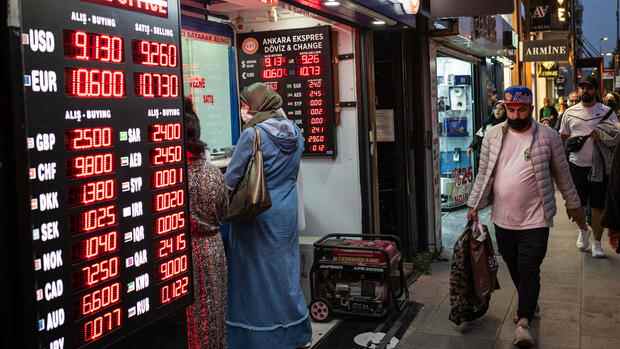The national currency has lost massively in value in recent months.
(Photo: imago images/NurPhoto)
Istanbul Politicians and the central bank in Turkey are increasingly distorting the country’s economic framework with their monetary policy – and thus increasing the risks. The Turkish central bank lowered the key interest rate in the country again on Thursday, from 12 to 10.5 percent. The TCMB announced this in the afternoon.
The central bankers cited the “weakening effect of geopolitical risks” and “the assessment that a recession is an unavoidable risk factor” as the reason, which is also becoming a growing problem for companies in Turkey.
The effects of high global inflation on inflation expectations and the international financial markets would be closely monitored. In Turkey, inflation was already over 50 percent before the start of the Russian invasion of Ukraine. It is currently officially 83 percent, a world record.
Turkey’s interest rate cuts are an outlier in a world where policymakers around the world are aggressively raising borrowing costs in response to the biggest inflationary shocks in decades. The Turkish economy is therefore in a big experiment.
Top jobs of the day
Find the best jobs now and
be notified by email.
The negative real interest rates lead to growth on credit, but above all to a problem: millions of investors in the country no longer know how to invest their money lucratively and safely. However, experts are now warning of the formation of bubbles on the markets. These must continue to be pumped full of money – otherwise they will burst.
Real estate, crypto, stock exchange – Turkish investors are pumping money into many markets
The low interest rates mean that more and more savers are investing in risky assets. Even investments in real estate that are actually safe have become risky: sales have multiplied in the past two years. Selling prices for existing apartments in Istanbul more than doubled in 2021. Land prices in the country have risen up to ten times since 2020.
But now, as in Germany, the real estate boom is coming to an end. Most recently, sales figures in September fell by 23 percent compared to the previous year. The demand for mortgage loans fell by 43 percent despite low interest rates.
Industry experts such as the Turkish business journalist Seref Oguz blame the high prices for this. “The price increases over the past two years have been so steep,” says the columnist for the business newspaper Dünya, “that it had to come to an end at some point.”
Inflation is at 83 percent – a world peak.
(Photo: imago images/ZUMA Wire)
More and more Turks are also invested in the crypto market. In Turkey, the high inflation and low key interest rates created sheer crypto euphoria, with the mass media also showing the Bitcoin rate alongside the dollar and gold rate on a daily basis, and even restaurants and car dealers accepting payment with the digital coins.
According to a Statista survey last year, one in five Turkish internet users owns or even trades cryptocurrencies. This is a world record. In Spain it was only ten percent of those surveyed, in the USA five percent and in Germany four percent. Up to two billion US dollars were traded in the country on local platforms such as Coinzo, Vebitcoin or Thodex – every day.
However, calculated in the national currency lira, Bitcoin has lost around half of its value since the beginning of the year. If you factor in inflation in the country, many people in Turkey have lost a lot of money as a result.
Incidents involving some closed Turkish crypto platforms also show how fragile investments in crypto currencies are. The fact that an emerging country like Turkey is being hit brings another truth to light: Investors are particularly affected for whom investments in Bitcoin and Co. are not play money, but sometimes the last way to build wealth.
However, this applies not only to investments in cryptocurrencies, but also to regular stock exchange trading. Turkish investors have triggered a stock market rally in their search for yield. The leading index ISE100 has risen by more than 170 percent within twelve months.
With real estate and crypto gradually disappearing as lucrative investments, observers are predicting a new stock market rally if interest rates continue to fall. In the coming days, Turkish corporations such as Sabanci Holding, Turkish Airlines and Akbank will report on their nine-month balance sheets. Many companies have passed the rising prices on to their customers, thereby multiplying sales and profits.
“Dünya” columnist Oguz fears that investors in the country could be encouraged to trigger the next stock market rally: “Because you can’t fight inflation with fixed income investments.”
More: Why there is a risk of crisis in the markets.

